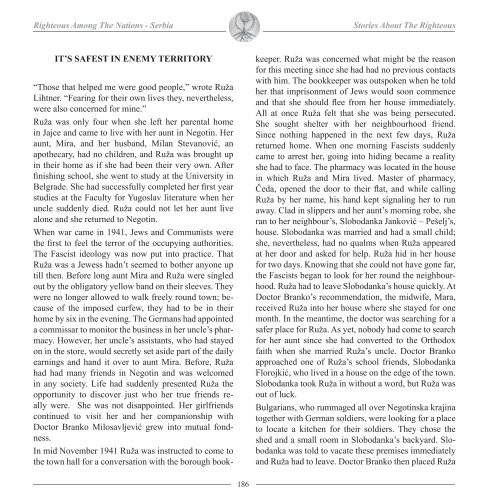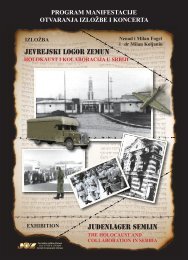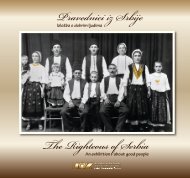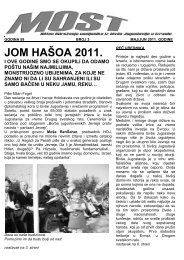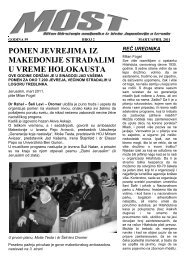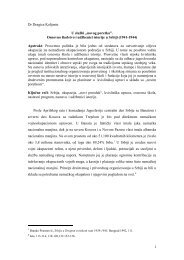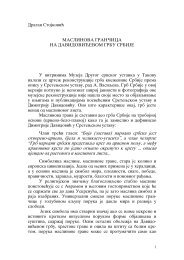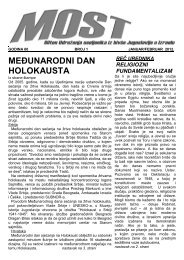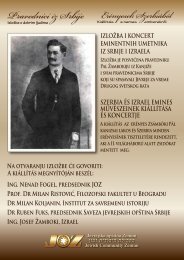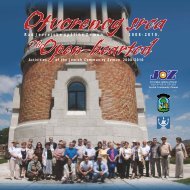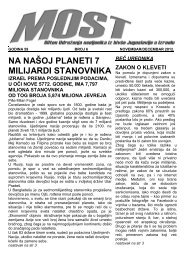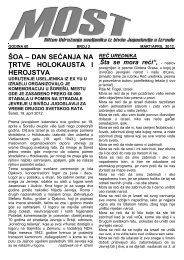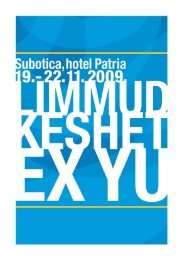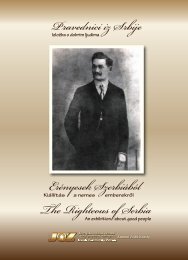Book on the Righteous - Jevrejska opština Zemun
Book on the Righteous - Jevrejska opština Zemun
Book on the Righteous - Jevrejska opština Zemun
You also want an ePaper? Increase the reach of your titles
YUMPU automatically turns print PDFs into web optimized ePapers that Google loves.
<strong>Righteous</strong> Am<strong>on</strong>g The Nati<strong>on</strong>s - Serbia<br />
Stories About The <strong>Righteous</strong><br />
IT’S SAFEST IN ENEMY TERRITORY<br />
“Those that helped me were good people,” wrote Ruža<br />
Lihtner. “Fearing for <strong>the</strong>ir own lives <strong>the</strong>y, never<strong>the</strong>less,<br />
were also c<strong>on</strong>cerned for mine.”<br />
Ruža was <strong>on</strong>ly four when she left her parental home<br />
in Jajce and came to live with her aunt in Negotin. Her<br />
aunt, Mira, and her husband, Milan Stevanović, an<br />
apo<strong>the</strong>cary, had no children, and Ruža was brought up<br />
in <strong>the</strong>ir home as if she had been <strong>the</strong>ir very own. After<br />
finishing school, she went to study at <strong>the</strong> University in<br />
Belgrade. She had successfully completed her first year<br />
studies at <strong>the</strong> Faculty for Yugoslav literature when her<br />
uncle suddenly died. Ruža could not let her aunt live<br />
al<strong>on</strong>e and she returned to Negotin.<br />
When war came in 1941, Jews and Communists were<br />
<strong>the</strong> first to feel <strong>the</strong> terror of <strong>the</strong> occupying authorities.<br />
The Fascist ideology was now put into practice. That<br />
Ruža was a Jewess hadn’t seemed to bo<strong>the</strong>r any<strong>on</strong>e up<br />
till <strong>the</strong>n. Before l<strong>on</strong>g aunt Mira and Ruža were singled<br />
out by <strong>the</strong> obligatory yellow band <strong>on</strong> <strong>the</strong>ir sleeves. They<br />
were no l<strong>on</strong>ger allowed to walk freely round town; because<br />
of <strong>the</strong> imposed curfew, <strong>the</strong>y had to be in <strong>the</strong>ir<br />
home by six in <strong>the</strong> evening. The Germans had appointed<br />
a commissar to m<strong>on</strong>itor <strong>the</strong> business in her uncle’s pharmacy.<br />
However, her uncle’s assistants, who had stayed<br />
<strong>on</strong> in <strong>the</strong> store, would secretly set aside part of <strong>the</strong> daily<br />
earnings and hand it over to aunt Mira. Before, Ruža<br />
had had many friends in Negotin and was welcomed<br />
in any society. Life had suddenly presented Ruža <strong>the</strong><br />
opportunity to discover just who her true friends really<br />
were. She was not disappointed. Her girlfriends<br />
c<strong>on</strong>tinued to visit her and her compani<strong>on</strong>ship with<br />
Doctor Branko Milosavljević grew into mutual f<strong>on</strong>dness.<br />
In mid November 1941 Ruža was instructed to come to<br />
<strong>the</strong> town hall for a c<strong>on</strong>versati<strong>on</strong> with <strong>the</strong> borough book-<br />
keeper. Ruža was c<strong>on</strong>cerned what might be <strong>the</strong> reas<strong>on</strong><br />
for this meeting since she had had no previous c<strong>on</strong>tacts<br />
with him. The bookkeeper was outspoken when he told<br />
her that impris<strong>on</strong>ment of Jews would so<strong>on</strong> commence<br />
and that she should flee from her house immediately.<br />
All at <strong>on</strong>ce Ruža felt that she was being persecuted.<br />
She sought shelter with her neighbourhood friend.<br />
Since nothing happened in <strong>the</strong> next few days, Ruža<br />
returned home. When <strong>on</strong>e morning Fascists suddenly<br />
came to arrest her, going into hiding became a reality<br />
she had to face. The pharmacy was located in <strong>the</strong> house<br />
in which Ruža and Mira lived. Master of pharmacy,<br />
Čeda, opened <strong>the</strong> door to <strong>the</strong>ir flat, and while calling<br />
Ruža by her name, his hand kept signaling her to run<br />
away. Clad in slippers and her aunt’s morning robe, she<br />
ran to her neighbour’s, Slobodanka Janković – Pešelj’s,<br />
house. Slobodanka was married and had a small child;<br />
she, never<strong>the</strong>less, had no qualms when Ruža appeared<br />
at her door and asked for help. Ruža hid in her house<br />
for two days. Knowing that she could not have g<strong>on</strong>e far,<br />
<strong>the</strong> Fascists began to look for her round <strong>the</strong> neighbourhood.<br />
Ruža had to leave Slobodanka’s house quickly. At<br />
Doctor Branko’s recommendati<strong>on</strong>, <strong>the</strong> midwife, Mara,<br />
received Ruža into her house where she stayed for <strong>on</strong>e<br />
m<strong>on</strong>th. In <strong>the</strong> meantime, <strong>the</strong> doctor was searching for a<br />
safer place for Ruža. As yet, nobody had come to search<br />
for her aunt since she had c<strong>on</strong>verted to <strong>the</strong> Orthodox<br />
faith when she married Ruža’s uncle. Doctor Branko<br />
approached <strong>on</strong>e of Ruža’s school friends, Slobodanka<br />
Florojkić, who lived in a house <strong>on</strong> <strong>the</strong> edge of <strong>the</strong> town.<br />
Slobodanka took Ruža in without a word, but Ruža was<br />
out of luck.<br />
Bulgarians, who rummaged all over Negotinska krajina<br />
toge<strong>the</strong>r with German soldiers, were looking for a place<br />
to locate a kitchen for <strong>the</strong>ir soldiers. They chose <strong>the</strong><br />
shed and a small room in Slobodanka’s backyard. Slobodanka<br />
was told to vacate <strong>the</strong>se premises immediately<br />
and Ruža had to leave. Doctor Branko <strong>the</strong>n placed Ruža<br />
186


